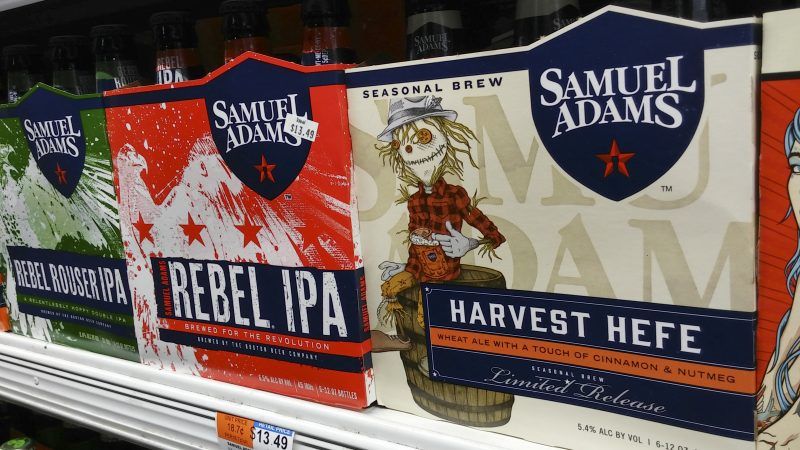Is Sam Adams' New 28 Percent ABV Beer Legal in Your State?
Remnants of Prohibition-era policies continue to frustrate brewers.

Fifteen states don't want you to try Sam Adams' new "extreme" beer. In fact, they make it a crime to sell it.
On October 15, Samuel Adams, the Boston-based brewing company, debuted this year's iteration of its Utopias "extreme beer." In addition to carrying the astronomical price tag of $210 dollars per 25.4-ounce bottle, Utopias has a substantial alcohol by volume (ABV) of 28 percent. That's about six times the ABV of an average beer, placing it well over the legal limitations that 15 states have imposed on ABV for a bottle of beer.
One of the 15 states banning Utopias is Utah, a state with notoriously strict alcohol laws. Earlier this year, the state imposed a 5 percent ABV limit on beer—a sign of the state easing up a bit. The 2019 law replaced an 86-year-old Prohibition-era law that placed a 3.2 percent alcohol by weight (ABW) cap on beer. (ABW is an outdated term, but a 3.2 percent ABW beer is equivalent to a modern 4 percent ABV beer.)
Jarrett Dieterle, senior fellow at R Street, a public policy organization dedicated to promoting, "free markets and limited, effective government," notes that while it's good that Prohibition-era laws are gradually being repealed, "many of the states that [do] repeal their 3.2 laws merely [replace] them with slightly less onerous versions."
Utah's 5 percent ABV limit on beer is only one of many halfhearted attempts by state legislatures to reel back the control the state has over what you can consume. Dieterle points out that Oklahoma simply created a new cap at 8.99 percent ABV, whereas Kansas' legislature only increased the 3.2 ABW percent cap to 6 percent ABV (a meager 2 percent increase in ABV).
The real issue with this archaic approach to beer regulating, is that the new laws are still, "arbitrary and especially unsuited to the modern craft-beer era." Dieterle tells Reason that "the vast majority of these laws would also impact beers with much lower ABV levels than 28 percent" such as Imperial IPAs, which typically range from 7 to 12 percent ABV. This means that the beer market in many of these former 3.2 cap states is significantly limited. State governments are essentially regulating away fun by stifling innovation in the craft beer industry.
Alcohol laws are a prime example of nanny state regulations that infantilize adults in the name of protecting citizens from themselves. Often the rules make no sense and don't even accomplish their stated purpose: Utah bans 28 percent ABV beer, but you can go down to the liquor store there and buy 50 bottles of vodka. A typical bottle of vodka has an ABV of 40 percent, and it sells for a lot less than Samuel Adams' Utopias beer.
As Dieterle says, "we have a wonderful diversity of beer varieties in modern America, and it just makes no sense to have these arbitrary caps on alcohol levels still in place."
More on ridiculous American beer laws:


Show Comments (31)